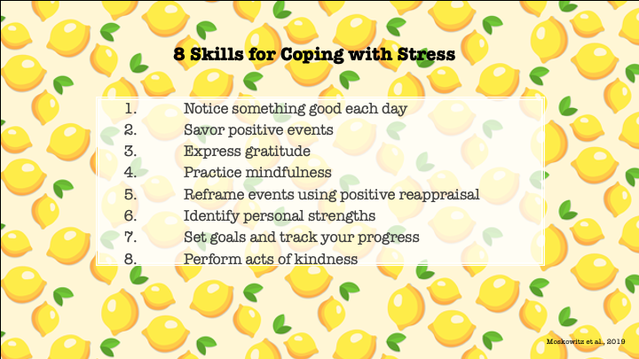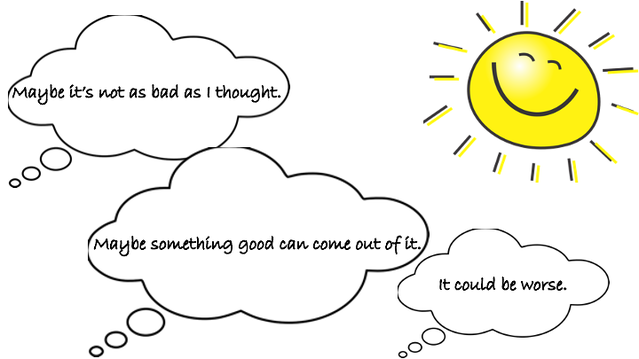Stress
Reframe Stress
Insights into positive reappraisal.
by Marianna Pogosyan Ph.D.THE BASICS
The human family has countless extraordinary features that we take for granted. Our modest sensory apparatus, for example, allows us to marvel at sunsets, savor chocolate, delight in sweet-smelling flowers, enjoy music, feel love.
Meet one of your everyday superpowers – positive reappraisal. As a long-studied emotion regulation strategy, positive reappraisal plays a key role in helping us cope with stress and thrive during hardships. Specifically, it allows us to reframe distressing events and generate positive emotions such as joy, gratitude and hope during difficult situations. The rewards for this remarkable skill to construct alternate ways of thinking about our circumstances and to feel positive emotions alongside negative emotions are backed by science. Through positive reappraisal not only can we influence the trajectory of our emotions and transform the meaning of negative experiences, but we can also improve our mental health and psychological well-being.
Psychologist Judith Moskowitz includes positive reappraisal as one of a set of positive emotion regulation skills for coping with stress. Over the years, she has taught these skills to hundreds of research participants who were experiencing high levels of daily stress. The results of her studies and seminars have added to the evidence for the astounding benefits of positive emotions for human resilience.

Here are 12 insights into positive reappraisal from Dr. Moskowitz.
What is positive reappraisal?
To understand reappraisal, you have to understand appraisal. Appraisal is your interpretation of the effect of something on your wellbeing – the way you think about something that’s happening and the way that it impacts you. How we appraise things, in turn, affects our emotional reaction. Positive reappraisal is revisiting the initial interpretation and thinking about it in a more positive way.
It’s good for your well-being
In our early observational studies, positive reappraisal was one of the coping strategies that kept coming up among people who were able to experience positive emotions in the midst of significant life stress. Consequent studies have shown that positive reappraisal is related to:
- Increased positive emotion
- Reduced distress
- Psychological adjustment to stressful life events
- Resilience
- Adaptive coping styles
- Post-traumatic growth
It’s a skill and a disposition
There are people who are natural positive reappraisers. But it’s also a skill that can be learned by anyone.
Learning positive reappraisal
We teach people this skill by first explaining what positive reappraisal is. Then we illustrate the link between how you appraise an event and your emotional reaction to it. To a large extent, if you change how you think about something, you can change your feelings about it. And then we explore the different ways of positively reappraising.

Make it a habit
Positive reappraisal is not like an antibiotic where you take it for 10 days and then you are done. Instead, it’s an overall approach to dealing with stress. Like with most skills, the more you practice finding the silver lining in all clouds – big and small, the better you get at it.
Model it to kids
Positive reappraisal might be easier for adults because they have the maturity to understand the mechanisms behind it. If you want to teach it to children, model positive reappraisal. Kids learn best from watching adults practicing this skill.
Be careful when you are appraising for someone else
Reappraising something for someone else might not always go well. When you tell a colleague, “Sorry the paper got rejected again! What a good chance to improve it and try again!” or to a child, “Sorry you didn’t make the basketball team – now you can finally focus on math!” it might make them feel like you are minimizing their stress. People have to come to their own positive reappraisals.
Mindfulness as a component of positive reappraisal
Sometimes you can jump too quickly into exploring what’s good about a stressful event. You need to be able to accept the negative. Don’t try to push it aside or pretend that it’s not happening. You are allowed to feel bad for a while and to think, “This is hard. This is stressful.” Then you can explore what is stressful about your situation and try to find something positive in it. Studies have shown that mindfulness and positive reappraisal enhance each other and create an “upward spiral.” Mindfulness can promote a more “empowering” interpretation of stressful events, which in turn can lead to a decrease in distress.
Set a low bar
Positive reappraisal is something you can try anytime, anywhere, even in very small doses. Next time you are stressed, try to understand what your appraisal is behind that, and then try to reappraise it so you are feeling more positive emotion about that event. Start small (e.g., It’s raining today. I missed the bus.) Then you can work up to reappraising more stressful events.
Daily moments add up
When you are experiencing stress, expect to go in and out of positive reappraisal. For example, when coping with COVID-19, there are moments where I can positively reappraise: I’m with my family. We’re getting along. We are having all our meals together. While those moments of positive reappraisal don’t offset the awful parts of living through a pandemic, they add up. Plenty of research shows that momentary experiences of positive emotions, even in the midst of difficult circumstances, can give you more inter- and intra-personal resources for coping with stress and improve your well-being in the long-run.
Find meaning
The main purpose of positive reappraisal is momentary experience of positive emotions, rather than meaning-making. However, meaningful reappraisals will have more impact on people, which is why we tend to gravitate towards them.
Get creative
Having taught positive reappraisal to many, Moskowitz is amazed at the creativity people use to reappraise stressful events. Inspiration can be found anywhere. For example, I received one of my own reappraisal techniques as a souvenir from a traumatic transcontinental flight. That flight had all the elements of a horror movie (lightening bolting at my window, wild turbulence, screaming passengers, praying passengers, cursing passengers, emptying-all-mini-alcohol-bottles-they-could-find passengers).
Even though it’s been years since I stumbled out of that plane with my wobbly legs, clutching my brand-new fear of flying, I still think of it on occasion. But now, surprisingly, I use the thought to help me feel better. Whether I find myself in a dentist chair before surgery or stuck in traffic before an exam, I take a deep breath, or two, and mumble to myself: At least I am not in an airplane.
Then, my fists unclench, my heart-rate steadies, and if I am lucky, my lips curve with a relieved smile.
Many thanks to Judith Moskowitz for her time and insights. Dr. Moskowitz is a professor of Medical Social Sciences Northwestern University Feinberg School of Medicine. She is the director of research at the Northwestern Osher Center for Integrative Medicine, and the president of the International Positive Psychology Association.